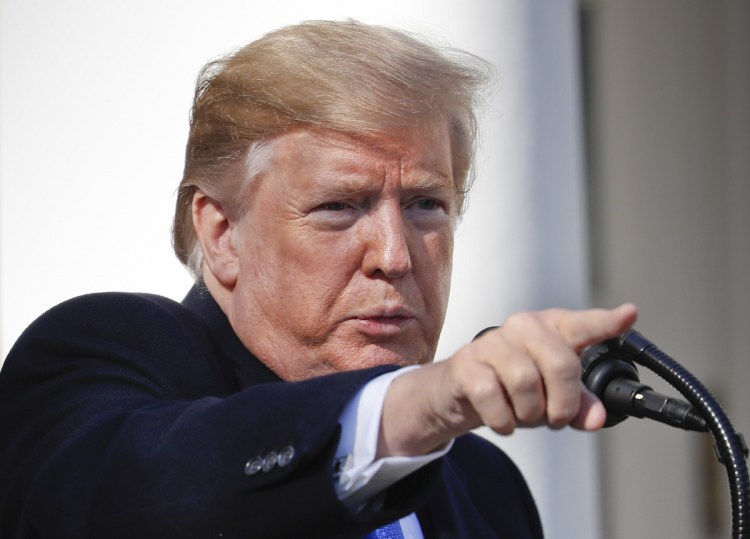WASHINGTON — The White House on Sunday defended President Trump’s declaration of a national emergency at the southern border and tried to clarify contradictory comments the president had made, marking the beginning of an uphill battle to preserve the designation from Democrats, some Republicans and a slew of legal challenges.
Trump’s announcement – an attempt to circumvent Congress and redirect taxpayer money to fund 230 miles of barriers along the U.S.-Mexico border – has already been hit with several lawsuits.
On Sunday, the attorney general of California reiterated that he was working with several other states and would be filing suit against the White House “imminently.”
The national emergency declaration also has divided Americans, triggering at least one protest in New York, with various groups promising to hold more across the country on Presidents Day.
In Washington, lawmakers, including some members of Trump’s own political party, are divided as to whether the emergency declaration is legitimate or constitutes a power grab that must be stopped. Democratic members of Congress are preparing a joint resolution to repeal the national emergency in the coming weeks, and are expecting some Republicans will cross the aisle to pass it.
“Frankly, the president is trying to take the power of the purse away from the legislative branch,” Sen. Tammy Duckworth, D-Ill., said on ABC News’ “This Week” on Sunday. “We are coequal branches of government, and he is trying to do a type of executive overreach, and it’s just really uncalled for.”
Trump made his case for the action Friday during a hyperbole-filled Rose Garden speech, claiming the United States is dealing with “an invasion of drugs, invasion of gangs, invasion of people” and that a wall was absolutely necessary.
“I could do the wall over a longer period of time,” Trump said then. “I didn’t need to do this, but I’d rather do it much faster.”
Democrats and other critics have seized on those comments in particular as proof that Trump didn’t need to declare a national emergency and, in doing so, was overreaching his executive authority.
However, in an interview on “Fox News Sunday,” White House senior policy adviser Stephen Miller defended Trump’s move, arguing that “this would not be even an issue if the president was invoking that statute to support some foreign adventure overseas.”
When host Chris Wallace pressed him on Trump’s own words, Miller insisted that there was an emergency at the southern border, saying there was an “increasing number of people crossing” and “a huge increase in drug deaths” since George W. Bush was president.
When Wallace countered with government statistics that showed attempted border crossings were actually at the lowest levels they had been in nearly four decades and that the overwhelming majority of drugs were caught at ports of entry, Miller demurred.
“You don’t know what you don’t know, and you don’t catch what you don’t catch,” Miller said.
“But as a matter of national security, you cannot have uncontrolled, unsecured areas of the border where people can pour in undetected.”
Even if Congress passes a joint resolution to repeal the national emergency, Trump would likely veto it, Miller suggested Sunday.
“He’s going to protect his national emergency declaration, guaranteed,” Miller said.
Miller said that by September 2020, “hundreds of miles” of new barriers will have been built along the border.
“If the president can’t defend this country, then he cannot fulfill his constitutional oath of office,” Miller said.
Duckworth said it was unclear whether there would be enough members of Congress to override a presidential veto on such a resolution but said there were many senators alarmed at the emergency declaration. She added that, even if one agreed with Trump that there is an emergency at the southern border, a wall would not be the most effective way to address it.
“If he wants to appropriate more money to put folks – more agents at the border to put more people at the ports of entry … we can have those conversations,” Duckworth told “This Week” host Martha Raddatz.
“But to take money away from (the Department of Defense) in order to build this wall that is essentially a campaign promise, I think, is really wrong priorities and I think it’s very harmful to the country.”
As examples, Duckworth listed several projects that could be jeopardized by the diversion of funds to construct a border wall – a list that House Speaker Nancy Pelosi’s office is in the process of amassing, the Hill reported.
Send questions/comments to the editors.



Success. Please wait for the page to reload. If the page does not reload within 5 seconds, please refresh the page.
Enter your email and password to access comments.
Hi, to comment on stories you must . This profile is in addition to your subscription and website login.
Already have a commenting profile? .
Invalid username/password.
Please check your email to confirm and complete your registration.
Only subscribers are eligible to post comments. Please subscribe or login first for digital access. Here’s why.
Use the form below to reset your password. When you've submitted your account email, we will send an email with a reset code.